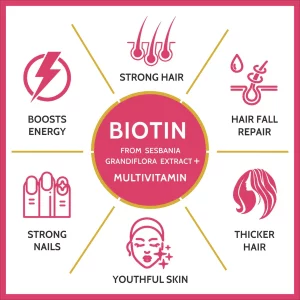Locations
- San Francisco
- Sunnyvale
- Palo Alto
- San Mateo
- San Jose
- Milipitas
- Seattle
- Walnut Creek
Biotin
Biotin, also known as B7, is a water-soluble vitamin found in foods such as eggs, milk, and bananas. This vitamin is important for overall health, and plays a role in cell growth, carbohydrate metabolism, and fatty acid synthesis.
What Does Biotin Do?
Biotin is involved in a wide range of metabolic processes primarily related to the utilization of fats, carbohydrates, and amino acids. It also influences cell growth and may help in maintaining blood sugar levels. Biotin is commonly supplemented for multiple conditions, such as hair loss, brittle nails, and nerve damage. Biotin is also thought to reduce inflammation, improve cognitive function, and increase HDL (good) cholesterol and decrease LDL (bad) cholesterol.
Symptoms of Biotin Deficiency
Biotin deficiencies are rare, but can cause hair loss, skin problems, and neurological issues. It is unusual to be deficient in biotin since only a small amount is needed to function properly. However, it is possible. Unlike other vitamin deficiency screenings, there isn’t a good laboratory test for detecting low biotin levels. Therefore, biotin deficiency is best identified by symptoms. Symptoms may include:
– Thinning hair
– A red, scaly rash around the nose, eyes, and mouth
– Depression
– Tiredness
– Hallucinations
– Tingling of the arms and legs.

Injectable Biotin Vs. Oral Supplements
While oral biotin supplements are a popular option for those looking to strengthen hair and nails, biotin injections are preferable in cases of acute deficiency. For maximum vitamin absorption, injections are much more efficient and reliable than oral supplements. Biotin IV or injection treatments allow the body to absorb the compounds directly, while the bioavailability of oral supplements is affected and reduced by one’s metabolism when passing through the digestive system.
Indications
Biotin is indicated in those with low biotin levels. Other conditions, such as skin rashes in infants, brittle nails, thinning hair, diabetes, or nerve pain have also been treated with biotin, but there is no research in its effectiveness.
Side Effects of Biotin
Although most who take biotin supplements do not experience any adverse effects, some minor effects such as nausea, cramping, and diarrhea can occur.
Interactions
Taking certain medications can lower your blood levels of biotin. Some of these medications include:
– Carbamazepine
– Phenobarbital
– Phenytoin
– Primidone
Although there are no risks in adding biotin to your diet or regimen, it is always important to check with your doctor before adding any new supplementation to your routine. Since biotin is water-soluble, any extra in your body flushes out through the urine, so overdose is highly unlikely. If you develop any unusual or unexpected rashes, see your doctor as this may be signs of an overdose. In this case, dosages will need to be adjusted.
The services provided by us have not been evaluated by the Food and Drug Administration. These products are not intended to diagnose, treat, cure, or prevent any disease. The material on this website is provided for informational purposes only and is not medical advice. Always consult your physician before beginning any therapy program. Any designations or references to therapies are for marketing purposes only.
© 2025 Revival Hydration. | All Right Reserved | Terms And Conditions